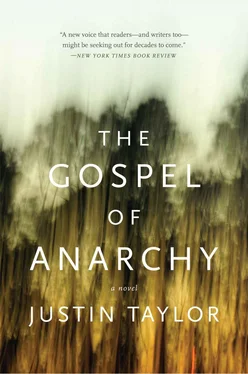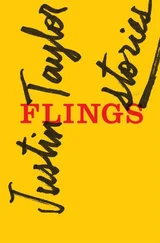I stood up from my computer chair and kicked it away behind me. I throbbed, skull crown to toe tips, and bit through my lower lip and wanted to shut my eyes while I came but would not let myself so much as blink and stared into the black rectangle until it reversed itself. When I did look away, finally, the afterimage stayed at the center of my vision, a fiery brightness that dissipated slowly, like water down a half-clogged drain, and through that receding curtain I watched my slime slide down the bright screen and pool on the keyboard and seep in. I folded the laptop closed, unplugged it, and took it into the bathroom. I plugged the drain and turned the water on. I filled the tub to the brim. This took a few minutes and during this time I drummed my fingers on the lid of the machine. But I was not nervous. I had already done the irrevocable thing. This was just a showy finish, an improvised ritual of consecration. The machine thrummed in my hands, plastic hot to the touch where the battery and fan were. I dropped it in and stepped back from the splash. I shut the bathroom door behind me, hoping for a spark that would send the whole complex up, but knowing I didn’t have that much luck coming. I got dressed and left the house.
But where to go?
All the main roads in Gainesville are named for the towns that they lead to. Archer, Waldo, Williston, Hawthorne, Newberry. Nobody ever meant for here to be anyplace special. It exists because someone wanted the county seat on the new railroad line, which Newmansville wasn’t. So they founded this place, named for an Indian killer, General Edmund Gaines, and made it the new seat of Alachua County, itself named for the Indians that General Gaines slaughtered. That’s as much as I know about Gainesville, other than that these days it’s the closest thing to an urban center between Jacksonville and Orlando, if you don’t count Tampa, which is off to the west. That’s all because of UF, the University of Florida, which is one of the largest schools in the whole country. Fifty thousand students, give or take, nearly half the population of the city. The school is more than the main thing here. It’s the only thing. If you don’t go there or teach there, then you fix the cars of those who do, or you own a restaurant with a sign reading STUDENT DISCOUNT SHOW ID taped in its front window, or if you don’t own it then your uncle does, and you hate working for the SOB but who else is going to hire you? The school is inescapable, like the humidity, like every shadow points back to the sun, and the locals hate the way the kids drink and fuck shit up on the weekends, and the kids look down on the townies, but the football stadium holds eighty thousand, and every game sells out.
I didn’t want to walk around campus, so I went the other way. East on University Avenue, past fast-food joints, a liquor store, a gas station, an office supply, the fucking Seagle Building, dim bars with muddy guitar washing from their propped front doors. I walked through the modest downtown, a couple of nice restaurants and frat-favored dance clubs, that’s about all it was, give or take a coffee shop and an art house movie theater. I walked past the library, out to where East University becomes Hawthorne Road, and the sidewalk grew cracked and weed-split, and the homes needed paint jobs they wouldn’t get. I kept on Hawthorne to where it crossed Waldo Road, which bears northeast. I stood at this intersection, contemplating my choices — two places I didn’t know anything about, both of which were positively nowhere, and neither of which I had any business being. Waldo had the regional airport. I could watch planes land and take off, crop dusters or whatever it was they had. Not that any would be out at this hour. (Not that I was on some schedule.) My only real plan was to walk all night.
I turned back, thinking maybe I’d end up at the school after all.
Maybe I would find an unlocked hall to shuffle around in. Or I could stand outside the admissions building, have myself a little revelation about doing the right thing in life. At the very least there would be the empty campus streets, and the wooded paths between the clusters of buildings. The paths were paved, and, since the Danny Rolling murders, now almost ten years ago, garishly lit. I thought I might end up at the bat house, over at the far end of campus, by the lake. The bats were protected or researched or something, I didn’t really know, but I knew that watching the bats rouse at sunset and take to the sky was a popular evening activity — something everybody got around to doing, sooner or later, though so far I hadn’t. But didn’t it stand to reason that there would be a similar viewing at sunrise? I could walk around Lake Alice, then go to the bat house at daybreak and watch the dark thousands as they flooded back into their stilt-built wooden mansion, a black river in the bruised and brightening sky.
I turned off University Avenue to walk down something that wasn’t sure if it was a street or an alley. The backyards of the houses that faced Southwest First were to my left side, and the back end of a strip mall that faced University was on my right. It was a rutted, potholed, gouged-out road — treacherous for bicycles, barely wide enough for two cars to pass each other. If you didn’t want to park behind the strip mall, there was really no reason to be on this street, which as far as I knew didn’t even have a name. I had the whole dismal scene to myself. Or thought I did, until I came within range of the smallish green dumpster behind the Gyro Plus, and noticed its being attended by a pair of urgent-looking punks. I understood their concern. The alley was well lit and if a cop happened to pass by they’d be nabbed for trespassing, vagrancy — who knew what else?
The one serving as lookout was a girl about my own age, though this in itself was nothing special in a college town. Everyone here is about our age, and anyone who’s not — you just see through them. I was at the approximate peak of my visibility. In a year you’d be able to read a street sign through me; in three years I wouldn’t register at all. In the meantime, however, here I was.
The girl seemed scrappy, wore black jeans and boots, and a green-and-black band tee shirt underneath a beat-to-hell leather jacket that was probably supposed to make her look tough, but it was outsize, hung loose on her thin frame, and made her actually look a little bit like she had been rooting through her big brother’s closet, playing dress-up. Her pursed lips were nearly white, and her gaze was steely, cold; or she wanted me to think that it was. I could feel her sizing me up as I approached. I kept my own eyes cast down. I wanted her to know I was no threat. We were two ships. But I did look up for a second, couldn’t help stealing a glance, and saw her lean over toward the dumpster and whisper to the man who, I could now see, was half in and half out of the thing, headfirst, his legs bicycling wildly in the air in what I understood was only a parody of struggle. He’d posted her as guard and now would not heed her warning. Giving her grief was obviously part of the pleasure he took in this mission. They were already behind me when I heard him shout, “Score! Dining room bag!”
I froze in my footsteps, then turned back.
“Thomas?” I called, my voice louder than I’d meant it to be. The girl looked positively frantic now. There was a nasty clang from within the dumpster. He’d hit his head clambering out. In one hand he held a big white sack of garbage with a hole torn in it; with the other he rubbed a spot on the back of his head. We were maybe fifteen feet apart, staring at each other.
“What the fuck?” the girl said. Thomas burst out laughing.
“Maybe the crazy bitch is right,” he said to her. “This is two amazing scores in one night. Maybe there really is a God.”
Читать дальше












